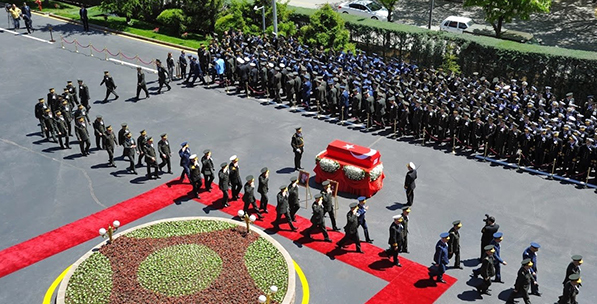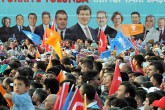Almost two years ago, while everybody was expecting the blossoming of democratic regimes in the Middle East, a military intervention took place in Egypt that overthrew the democratically elected government of President Mohammed Morsi. The coup and aftermath generated a huge reaction from the Turkish public and politicians. Although some at that period considered this as a show of solidarity by the Turkish government with the Muslim Brotherhood in Egypt, what triggered the Turkish reaction to a military coup in a country has more to do with the trauma, scars and painful memories of previous coups in Turkey. The scenario was very familiar for the Turkish public and the path was well-known. Kenan Evren was one of the architects of this traumatic experience and memory.
It is very difficult for people in the countries with long and uninterrupted democratic experiences to understand the impact of military coups on its victims. For many in the West, military coups are usually in the fiction of Latin American novelists and filmmakers, in the movies about the Middle Eastern dictators or in “The Adventures of Tintin.” Because of that it is sometimes difficult to imagine what a military coup can do to a nation, its destructive effects on social relationships and to the institutions of its political system. These impacts are almost universal for the victims of coups around the world. The victims of coups in Latin America face the same form of persecutions as the victims of juntas in Africa. The methods, techniques and strategies of coup makers are similar in the Middle East and in Southeast Asia. Even the planning and execution of the coups demonstrate similar patterns around the world. Coups stops the flow of time, and for all the victims around the world, a coup changes he lives, having to live long years with the trauma and very deep scars in their imaginations.
Turkish society has suffered from multiple, different military coups. However, the 1980 coup has a more noticeable place in the history of Turkish democracy and in the collective memory of society. It was not that society was not familiar with military intervention in politics. In 1960, a military coup interrupted the democratic process in Turkey for the first time. Then Prime Minister Adnan Menderes, together with Hasan Polatkan and Fatin Rüştü Zorlu, were executed after a summary trial administered by the junta with irrelevant charges. Later, in 1971, the military once more intervened in the politics in Turkey with a memorandum. However, in terms of its length, impact and legacy, the 1980 military coup led by General Kenan Evren, who died yesterday at the age of 98, had a more destructive effect than any other military intervention.
The coup not only eradicated the whole political establishment in Turkey, but also brought a largely repressive political system that limits basic freedoms and liberties, including freedom of expression, the press and organization, in Turkey. The unlawful detentions, arrests and executions have become a symbol of the years that a military junta ruled the country with an iron fist. During this period, political parties were prohibited and a large group of former politicians were banned from running for public office. While politicians had failed to achieve effective civilian control of the military since 1960 coup, the military excelled in overthrowing the government, and with the 1980s, the junta tried to prove the longevity of military predominance. The coup makers made sure that they would be immune and proofed their coup as much as possible to this effect. They also established institutions that would guarantee long-term survival of the active military control of civilian and political life.
Following the coup, Turkey stayed under the shadow of Evren, then president, and his junta for long years. The 1980s, despite very significant developments in the economy, technology and infrastructure due to then Prime Minister Turgut Özal’s reforms, could not achieve the same level of development in ter


